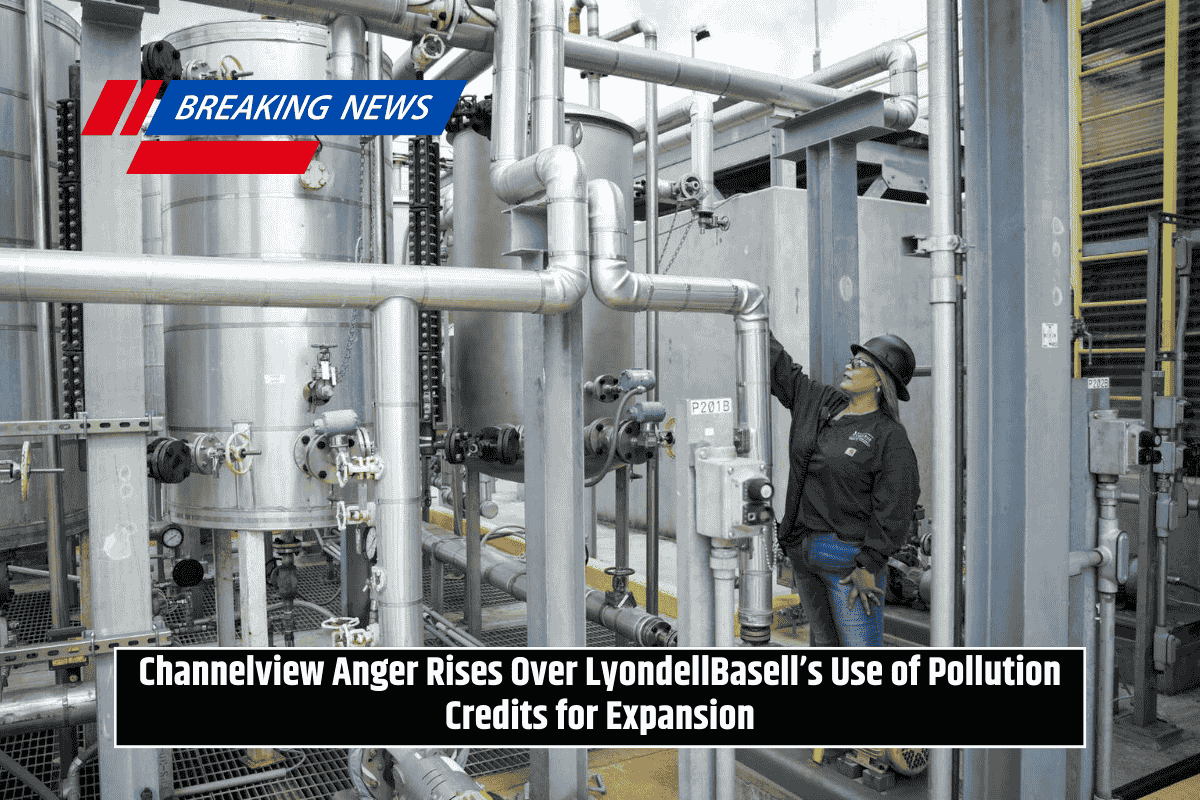Channelview residents are voicing strong opposition to LyondellBasell’s proposal to expand its chemical complex along the Houston Ship Channel. The company plans to buy pollution credits—known as emissions reduction credits—to offset the additional emissions from a new ethylene-to-propylene unit.
But for many residents, the idea of “buying the right to pollute” feels like adding more burden to a community already struggling with poor air quality.
What Are Pollution Credits?
Pollution credits are part of a system designed to reduce overall ozone pollution in the Houston area. If one company reduces emissions or shuts down, it can sell credits to another company that wants to expand. On paper, this ensures the region’s pollution levels go down over time.
But critics argue that the system simply shifts pollution around instead of truly reducing it. In Channelview, where residents already live with frequent smog, they feel they’re paying the price while other companies profit from selling unused credits.
Health Concerns in Channelview
Channelview sits in a region marked as “severe nonattainment” for ozone pollution, meaning it consistently fails to meet national standards. Ozone smog can damage lungs, lower breathing capacity, and trigger serious health problems—even at low exposure levels.
Residents say this expansion only makes matters worse. Longtime resident and organizer Carolyn Stone summed it up: “We are overburdened already.” Many locals worry about cumulative exposure from decades of chemical operations in their neighborhoods.
Adding to these concerns, community groups have pointed to high benzene levels recorded near LyondellBasell’s fence line monitors. Benzene is a dangerous pollutant linked to leukemia, immune system harm, and risks during pregnancy.
LyondellBasell’s Response
At a public meeting, company representatives explained that the new unit will use existing infrastructure to recapture some emissions. Gregory Cannon, Director of Health, Safety, and Environmental Compliance, said the project will make plastics used in everyday products like food containers and bedding.
He also stressed that buying credits is required by law and ensures that any new emissions are offset by reductions elsewhere in the region. Lyondell insists it is staying within regulatory limits and has not violated federal agreements on emissions control.
Why Residents Are Skeptical
Environmental advocates argue that the credits system does not truly reduce emissions in frontline communities. Jennifer Hadayia of Air Alliance Houston pointed out that many credits are bought from facilities that already planned to shut down, meaning the offsets don’t bring new benefits.
“Wouldn’t there be reduced VOCs by simply not allowing this expansion to happen?” Hadayia asked at the meeting.
Many residents echoed this sentiment. Mario Martinez, who lives about two miles from the plant, said, “If Lyondell cannot do without buying credits to stay under their thresholds, I believe it should not be accepted for our personal health.”
A Community at a Crossroads
Channelview residents say they appreciate some of LyondellBasell’s community efforts, but past violations and continued expansion have left them wary. With more than 130,000 people living within 5 miles of the complex, locals feel their health is at risk while industry profits grow.
The debate over LyondellBasell’s expansion highlights a larger struggle in Houston’s industrial corridor: balancing economic growth with community health. For Channelview residents, pollution credits feel less like a solution and more like a loophole.
While regulators see the system as a way to gradually cut regional emissions, those living next door to chemical plants are left wondering if their air—and their health—will ever truly improve.
